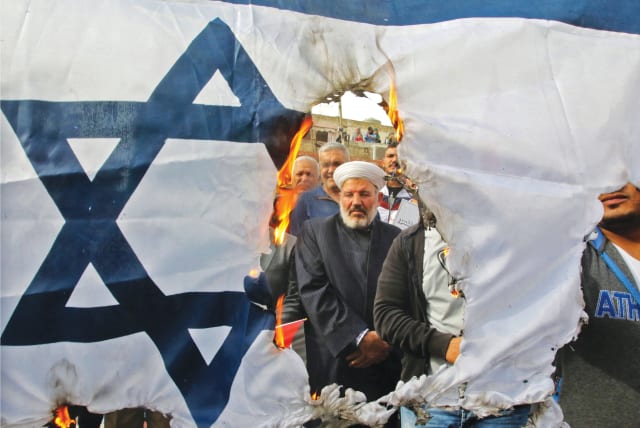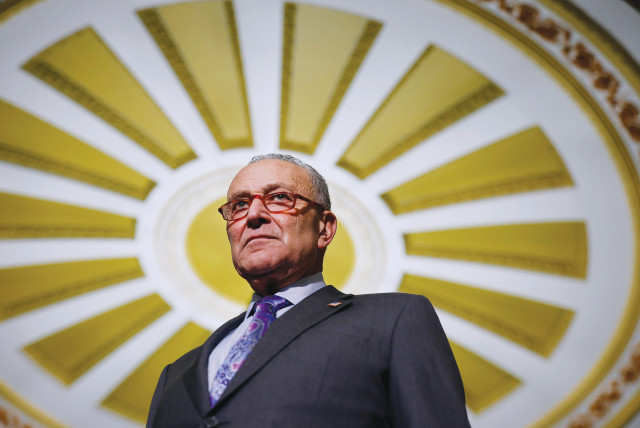Voices from the Arab press: Lebanon: Immediate ceasefire or inevitable disaster

A weekly selection of opinions and analyses from the Arab media around the world.
Lebanon: Immediate ceasefire or inevitable disaster
An-Nahar, Lebanon, March 30
If the information provided by sources close to Hezbollah is accurate, then significant developments in southern Lebanon are on the horizon.
It appears that Wafiq Safa, a security official in Hezbollah, recently visited the UAE to convey his leadership’s willingness to cease fighting in southern Lebanon and establish a demilitarized zone under the supervision of UNIFIL and the Lebanese Army.
The conditions include a clear demarcation of land borders, similar to the agreement reached on maritime borders.
This news comes amid Hezbollah’s involvement in supporting Hamas in Gaza and a notable shift in its official stance toward resistance against Israel. It seems that Hezbollah is signaling a desire to de-escalate tensions and seek a settlement with Israel, possibly with the mediation of the UAE, to avoid a full-scale war.
However, Israeli sources have swiftly rejected any agreement that does not involve Hezbollah surrendering its weapons to the Lebanese Army and relinquishing control over Lebanese territory, leading to Israel’s escalated bombings in Baalbek and Hermel.
This turn of events suggests that Hezbollah may have miscalculated the situation in Gaza and Israel when it decided to engage in supporting Hamas. The Gaza conflict unfolded differently than anticipated, with Israel responding aggressively to what it perceived as an existential threat. Despite international support to undermine Hamas, the situation remains dire, especially in the besieged city of Rafah.
Hezbollah’s erroneous assessment of Israel’s political landscape and military readiness has led to a critical juncture. The internal turmoil in Israel did not deter the unified stance against Hezbollah, reflecting a consensus on addressing threats from both Gaza and Lebanon.
The failure to heed these warning signs has left Hezbollah with a stark choice: either accept a ceasefire and disengage or face the full force of Israel’s military capabilities, potentially dragging the region into a broader conflict with severe consequences. – Ali Hamada
American shifts toward Palestine
Al-Ahram, Egypt, March 29
The impact of recent events on America’s stance regarding the Palestinian issue cannot be underestimated, particularly following the Israeli war on Gaza. The shift in America’s stance is evident, with even key figures within the government expressing criticism toward Israel.
This change is not limited to public opinion but extends into the highest echelons of power. For example, US Senate Majority Leader Chuck Schumer recently delivered a speech before the Senate where he openly criticized Netanyahu. This marks a significant departure for Schumer, a longtime advocate for Israel.
These shifts in American policy may not yet constitute a full-fledged strategy, but they are certainly significant tactical moves that will have far-reaching implications. The evolving attitudes toward Israel are partly due to the changing generational landscape, as well as Israel’s right-wing government, which has been accused of perpetrating acts of genocide against Palestinians. This departure from moral values is being duly noted by the international community, and there is a growing recognition that the Palestinian issue cannot continue to be trapped in the same cycle it has been for decades.
The recent formation of a six-party group, including Egypt, Saudi Arabia, the UAE, Qatar, the Palestinian Authority, and Jordan, meeting with Secretary of State Antony Blinken in Cairo, underscores the need for a new approach to addressing the Palestinian conflict.
The shift in the UN and European stance toward a Palestinian state further emphasizes the necessity for political solutions over mere humanitarian efforts. The next steps taken must be politically calculated, aiming toward the establishment of a Palestinian state that safeguards the remaining Palestinian territory and secures a viable future for the Palestinian people. – Osama Saraya
Which of the two Koreas do we want to be?
Annahar, Kuwait, March 30
After the conclusion of World War II, the Korean people found themselves split between North Korea, encompassing 120,000 square kilometers, and South Korea, spanning 100,000 square kilometers.
The North was the richest and most advanced, and its population was half the population of the South. The richer North embraced a communist ideology championing state control over the economy, supported by the Soviets and China, while the South adopted capitalism, emphasizing the importance of a thriving private sector with the aid of American influence.
In 1946, the inhabitants of South Korea protested against the American presence, advocating for their withdrawal. By 1948, both nations had officially declared their autonomy.
Nevertheless, tensions escalated two years later when the North, with backing from Russia and China, launched an invasion into the South. Despite the support of the United Nations, the US, and Western nations for the South, a devastating three-year conflict ensued, resulting in three million casualties, ultimately bringing both countries back to their original borders.
Unfortunately, the aftermath of war often demonstrates the futility of violence as a means of conflict resolution.
Fast-forward to today, the population of North Korea stands at 25 million with an income of $40 billion. However, with an average per capita income of $1,800, North Korea is ranked among the poorest nations globally, vulnerable to periodic famines. Conversely, South Korea boasts a population of 56 million, with a staggering income of $3 trillion and an average per capita income of $56,000, solidifying its status as one of the wealthiest nations on the planet.
The critical question now arises: as the Kuwaiti populace embarks on a journey beyond the oil economy, which Korean model do they envision for their future? Do they opt for the path of North Korea, characterized by the dominance of the rentier state and authoritative government intervention in all aspects of life, closely mirroring their current situation? Or do they aspire to emulate South Korea, championing a model that nurtures a vibrant private sector focused on productivity, competition, and global export?
The choice demands thoughtful consideration, one that can be voiced through the upcoming election on April 4, when selecting leaders who will safeguard wealth development, bolster the existing administration, and promote private sector growth. Alternatively, there is the option to elect individuals who perpetuate the rentier state’s survival, advocating against the private sector, even if covertly.
The decision is ultimately in our hands, as we deliberate on whether we desire to follow the path of progress and prosperity embodied by South Korea or succumb to the repressive authoritarianism reminiscent of North Korea. – Sami Al-Nisf
Is Iran seeking to avoid war at all costs?
Asharq al-Awsat, London, March 28
The recent meeting between Esmail Qaani, the commander of the Revolutionary Guard Corps, and Hezbollah’s secretary-general, Hassan Nasrallah, in Beirut has raised questions and concerns among the party and its supporters.
Reports reveal that Nasrallah was instructed by Iranian Supreme Leader Ali Khamenei not to retaliate against Israeli attacks, even if they exceed the defined rules of engagement.
This decision reflects Iran’s desire to avoid further escalation of conflicts, especially with the US, and to protect the strategic positions it has established, including Hezbollah in Lebanon. Qaani emphasized that Iran aims to avoid a major confrontation at all costs.
However, prioritizing the regime’s interests over those of the people under its control has caused embarrassment for Hezbollah.
Nasrallah’s previous claims of possessing deterrence capabilities to prevent Israeli aggression have been proven wrong, as massive destruction and displacement have occurred in southern Lebanon. The party’s failure to respond effectively has led to criticism not only from within its supporters’ circle but also from the Lebanese population and the broader resistance front.
Amid this crisis, Wafiq Safa, Hezbollah’s coordination officer, visited the UAE. There, Safa proposed a ceasefire in southern Lebanon and the establishment of a demilitarized zone along the border, with military presence limited to UNIFIL and the Lebanese Army.
However, the UAE demanded the complete disarmament of Hezbollah before any agreements could be reached, leading to escalated Israeli bombings in Lebanon.
The Iranian regime’s support for proxy wars while neglecting its own citizens’ basic needs has come under scrutiny. Despite allocating significant funds to military interventions and covert operations abroad, Iran faces internal challenges such as poverty and environmental degradation. The government’s mismanagement of resources and lack of focus on domestic issues have led to unrest among marginalized communities, environmental disasters, and social inequalities. The deteriorating condition of Lake Urmia, widespread poverty, and discrimination against minorities highlight the regime’s misplaced priorities.
As support for the government erodes and instability increases, the potential downfall of the Iranian regime seems imminent.
It is time for Tehran to address pressing domestic concerns and adopt a balanced approach that ensures stability and prosperity for its citizens. Ultimately, the regime’s bullying tactics will not withstand the scrutiny of its own people. – Hoda Husseini
Translated by Asaf Zilberfarb.
Jerusalem Post Store
`; document.getElementById("linkPremium").innerHTML = cont; var divWithLink = document.getElementById("premium-link"); if (divWithLink !== null && divWithLink !== 'undefined') { divWithLink.style.border = "solid 1px #cb0f3e"; divWithLink.style.textAlign = "center"; divWithLink.style.marginBottom = "15px"; divWithLink.style.marginTop = "15px"; divWithLink.style.width = "100%"; divWithLink.style.backgroundColor = "#122952"; divWithLink.style.color = "#ffffff"; divWithLink.style.lineHeight = "1.5"; } } (function (v, i) { });

